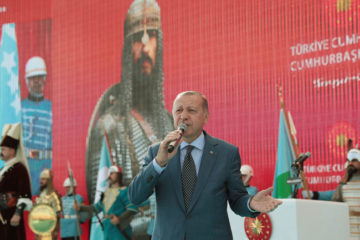Putin May Not Really Want a Syria Deal: Leonid Bershidsky

published Sep 19th 2016, 4:48 pm, by Leonid Bershidsky
(Bloomberg View) —
What looked like a promising U.S.-Russian deal in Syria has collapsed amid mutual recriminations. Throughout the failed truce, Russia behaved as though it didn’t attach much value to it, and it probably doesn’t want an agreement with the U.S. to stick just yet.
The deal, finalized on Sept. 9 after exhausting talks, called for a week’s truce to start humanitarian aid flowing to the ravaged city of Aleppo and then for the creation of a U.S.-Russian joint implementation center that would coordinate the two countries’ strikes against jihadi groups such as Islamic State and Jabhat Fateh al-Sham, formerly known as Jabhat al-Nusra. The process on the ground, however, never really took off. The fighting continued in the absence of an efficient cease-fire monitoring system. On Saturday, the Kremlin was outraged by an apparently erroneous air raid by the U.S.-led coalition in the vicinity of Deir ez-Zor, where, instead of bombing Islamic State positions, the allied planes dropped bombs on a surrounded unit of the Assad army, killing dozens of soldiers.
Russia accused the U.S. of “defending ISIS” and called an emergency meeting of the U.N. Security Council, where the U.S. counterattacked. Samantha Power, its ambassador to the U.N., called the Russian reaction “a stunt replete with moralism and grandstanding” that was “uniquely cynical and hypocritical” because Russia had never demanded investigations or called Security Council meetings when Assad’s troops bombed civilian targets. Secretary of State John Kerry also used the word “grandstanding” in a CNN interview on Monday, demanding that Russia get the Assad regime to allow the free passage of humanitarian cargoes to Aleppo.
By this point, it would take a deeply flawed understanding of how Vladimir Putin’s Russia operates to expect the truce and coordination plan to proceed. “Stop the showboating,” in Kerry’s words, is not the kind of message that assures Russian cooperation. Putin walks away at the slightest sign of disrespect. His recent conflict with Turkish President Recep Tayyip Erdogan over a downed Russian plane — and its resolution after Erdogan found it in himself to apologize — should have told U.S. officials something about the Kremlin’s inflated sense of dignity, and the importance it attaches to appearances.
Russia’s side in the conflict — the Assad government — controls the most territory in Syria, and it has been the more militarily successful one in recent months since it received strong support from Russia and Iran. The U.S. is backing smaller, less successful, more disparate groups. To Putin, this means the U.S. should implicitly agree to play second fiddle. Within the logic of the conflict, it makes certain sense, but it’s difficult for the U.S. to accept because it’s the stronger military power and because it has committed to fight Assad as an absolute evil, a position that’s hard for the current administration to abandon openly.
Kerry doesn’t have Erdogan’s freedom to stroke Putin’s ego to achieve strategic or tactical goals. As it is, his attempts to reach a deal have given rise to much grumbling in the U.S., most importantly at the Pentagon, which can alone ensure the success of military coordination with Russia. An Erdogan-style apology, and not a grudging one quickly followed by accusations, could have bought Russian help in getting Assad to remove obstacles to humanitarian aid. But it would have been unimaginable from Kerry or Power.
To Putin, the acerbic remarks from U.S. officials mean they are not serious about cooperating. This strengthens his publicly stated mistrust of U.S. motives. On Saturday, he told reporters that he saw “terrorists” in Syria using the truce to regroup rather than the U.S. trying to separate jihadis from the “healthy opposition.”
So the inevitable happened. On Monday, the official Syrian news agency, SANA, reported that President Bashar al-Assad’s military command had decided to end the truce because opposition groups had breached it more than 300 times. Like all such claims by both Assad and the rebels, this one is hard to verify, but the mutual accusations aren’t important: Assad couldn’t have broken off the cease-fire without consulting Moscow.
Kerry on Monday still appeared to cling to the hope that the deal would be revived. State Department spokesman John Kirby put out a statement saying, “While we have seen comments attributed to the Syrian military, our arrangement is with Russia, which is responsible for the Syrian regime’s compliance, so we expect Russia to clarify their position.” The answer the U.S. will get is predictable: Russia will stand behind the Assad regime as the more trusted partner. It has little to lose by doing so.
As Kerry pointed out in the CNN interview, the lack of mutual trust between Putin and the Obama administration hasn’t prevented them from cooperating on the Iran nuclear deal or on combating Ebola. In Syria, however, trust — and what Putin sees as adequate respect — is far more critical. For the cooperation to be successful, the sides have to accept each other’s intelligence so they can agree on common targets. They also have to believe that after a putative victory over the jihadis, neither side will ignore the other’s political interests. None of that is possible with the current cast of characters.
Given how easily Putin is allowing Assad to break off the truce, it’s apparent that the Kremlin is not really hoping for a binding deal on Syria while Barack Obama is in the White House. There may be a few more false starts before the U.S. election, but, most likely, Putin is waiting for it to play out. If Donald Trump wins, he may treat the Russian leader with the respect he demands and yield to Putin the leading role in fighting the jihadis. If Hillary Clinton wins — a less favorable outcome for Putin — the Kremlin can still hope she will want to minimize the U.S. role in Syria, where the U.S. doesn’t have much to gain. At the very worst, the Kremlin can still imitate talks and agreements while continuing to prop up the stronger side in the war — and strengthening its negotiating position.
This column does not necessarily reflect the opinion of the editorial board or Bloomberg LP and its owners.
To contact the author of this story: Leonid Bershidsky at lbershidsky@bloomberg.net
For more columns from Bloomberg View, visit Bloomberg view
copyright
© 2016 Bloomberg L.P







No Comment